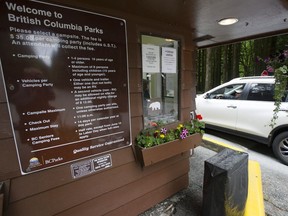Opinion: B.C. parks should be for all, not just the wealthy
B.C.'s campsites were built and paid for by British Columbians for the enjoyment of present and future generations.

Article content
B.C.’s parks and campsites are marvels that allow B.C. families, and those from outside the province, to go out and enjoy the best of what this province has to offer: Mountains teeming with wildlife, rivers and lakes full of fish, a nice campfire to enjoy with friends and family, and of course a few mosquitos. These campsites were built and paid for by British Columbians for the enjoyment of present and future generations. For many, B.C.’s parks and campsites are reasons why they make Beautiful British Columbia their home.
Over the years, funding for B.C. Parks has been reduced relative to other government ministries. Investment in new infrastructure was reduced, and campsite demand quickly exceeded supply. As the line-ups for campsites got longer, the agency was forced to create an electronic booking system in an attempt to ensure equitable access and allow people to plan their holidays.
The booking system hasn’t gone as planned. Tour companies, and other businesses, are making money flipping public campsites like scalpers. British Columbians who have paid to build public campsites and are looking for low-cost public recreation, have been priced out. The reality is if you can pay to rent a motorhome for a week, you can get one of a finite number of reserved public campsites. If you can’t afford to rent a motorhome, you might have to find another place to camp. It reeks of regressive policy practices.
This issue is similar to B.C.’s real estate market where “shadow flipping” and other unscrupulous practices have been reported, particularly in the Lower Mainland. But unlike real estate, which is privately owned, B.C. Parks are a public good, paid for and owned entirely by British Columbians.
Recently, the provincial government announced an end to self-regulation for B.C. real estate due to unethical practices. Ironically, B.C. Parks is not a “self-regulated industry”. It is a public trust, regulated by government, and the regulator says it has no problem subsidizing business interests in B.C. parks and campsites. This response alienates those who live in the province and depend on low-cost public recreation. The same business practices that are considered socially undesirable by a private industry are deemed okay when it is government regulated.
For tour companies and businesses, there are alternatives to publicly funded campsites. Private campsites abound in B.C. — they are often found in desirable locations and offer premium amenities such as power and water. These campsites are not heavily subsidized by taxpayers and as a result they reflect a higher price point closer to market value. These private campsites are the place where tour companies can book their clients and run their business without negatively impacting the people who pay to build and maintain B.C. parks and campsites every paycheque.
The B.C. Wildlife Federation does not believe the current system meets the needs of British Columbians. B.C.’s parks and campsites were created for the public to enjoy and for British Columbians to have priority access. Private industry benefitting financially by flipping campsites is not consistent with the intent of this public good. Government should be responsive to that.
As a whole, B.C. needs to increase investment in its natural resources. While we have added nearly two million people in the last 30 years and increased budgets across health, education and social services, funding and capacity for B.C. parks, campsites, fish, wildlife, and biodiversity conservation have declined precipitously. Increased investment in parks and campsites will help.
Investment in new and existing infrastructure to create more campsites will help alleviate long-term issues with supply. The online booking system needs a re-vamp to ensure the needs of the people who paid to build B.C.’s parks are met first. British Columbians should get first crack at reservations. To reduce flipping, those who book should be the same people who check in at the campsite.
We need to start a conversation with British Columbians being asked how much they are willing to pay, and what they would like to see in their campsites, to ensure long-term public access to this public resource.
B.C. is one of the greatest places on earth to live, but we need to ensure everyone has affordable access to our natural resources so that future generations of British Columbians know the value of wilderness and do their best to conserve it.
Troy Halliday is chair of the B.C. Wildlife Federation’s habitat and sustainability committee.





Postmedia is committed to maintaining a lively but civil forum for discussion. Please keep comments relevant and respectful. Comments may take up to an hour to appear on the site. You will receive an email if there is a reply to your comment, an update to a thread you follow or if a user you follow comments. Visit our Community Guidelines for more information.